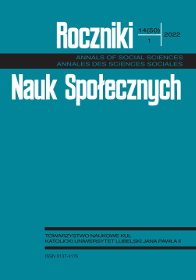European Universalism in Times of Crises
Abstract
The article presents a discussion on European universalism, the most important goal of which is to disseminate European values and ideas. Historically, universalism has been accompanied by a tendency towards economic and geopolitical expansion of the Western Europe great powers. The renaissance of European universalism took place along with the processes of European integration. A special condition for the revival of this universalism was, on the one hand, the strategy of left-wing intellectuals related to the rebuilding of political influence under the conditions of European integration. On the other hand, successive European crises provoked Eurosceptic moods, which prompted the pro-European elite to mobilize societies for the benefit of the European Union. The article discusses the latest version of European universalism, which was directed mainly inside the EU in order to counter-act disintegration and to base the integration project more closely on European values.
References
Amin S. (1989), Eurocentrism. Modernity, Religion, and Democracy. A Critique of Eurocentrism and Culturalism, New York: Monthly Review Press.
Balibar É. (2016), Des Universels. Essais et conférences, Paris: Editions Galilée.
Bibo I. (2012), Eseje polityczne, Kraków: Universitas.
Bock-Côté M. (2021), La Révolution racialiste, et autres virus idéologiques, Paris: Place des éditeurs.
Burke E. (2009), Reflections on the Revolution in France, Oxford – New York: Oxford University Press.
Dugin A. (2012), The Fourth Political Theory, Budapest: Arktos Media.
Encyclopedia Britannica, Political Pluralism (2008), [w:] https://www.britannica.com/topic/pluralism-politics [dostęp: 27.12.2021].
Epstein R. A. (2014), Overcoming ‘Economic Backwardness’ in the European Union, Journal of Common Market Studies, 52(1), s. 17-34.
Epstein R. A., Jacoby W. (2014), Eastern Enlargement Ten Years On: Transcending the East–West Divide? Journal of Common Market Studies, 52(1), s. 1-16.
Fei Jiang (2017), A Critical Discourse Analysis of Soft Power, [w:] N. Chitty, L. Ji, G. D. Rawnsley, C. Hayden (red.), The Routledge Handbook of Soft Power, London – New York: Routledge, s. 48-61.
Follesdal A., Hix S. (2006), Why There is a Democratic Deficit in the EU: A Response to Majone and Moravcsik, Journal of Common Market Studies, 44(3), s. 533–562.
Fukuyama F. (1992), The End of History and the Last Man, New York: Free Press.
Giddens A. (1998), The Third Way: The Renewal of Social Democracy, Cambridge: Polity.
Girard R. (1986), The Scapegoat, Baltimore: Johns Hopkins University Press.
Gramsci A. (1971), Selection from the Prison Notebooks of Antonio Gramsci, New York: International Publishers.
Gray J. (2000), Two Faces of Liberalism, Cambridge: Polity Press.
Grosse T. G. (2020), Nation-building oraz nation-preserving w Polsce w dobie transformacji i integracji europejskiej, Studia Polityczne, 49(1), s. 99-123.
Grosse T. G. (2021), Cztery wymiary integracji, Warszawa: Wydawnictwo Sejmowe.
Grosse T. G. (2022), Suwerenność i polityczność. Studium integracji europejskiej, Warszawa: WIWS.
Hazony Y. (2018), The Virtue of Nationalism, New York: Basic Books.
Hechter M. (1975), Internal Colonialism: The Celtic Fringe in British National Development 1536, Berkeley: University of California Press.
Hooghe L., Marks G. (2009), A Postfunctionalist Theory of European Integration: From Permissive Consensus to Constraining Dissensus, British Journal of Political Science, 39(1), s. 1-23.
Hooghe L., Marks G. (2019), Grand Theories of European Integration in the Twenty-First Century, Journal of European Public Policy, 26(8), s. 1113-1133.
Janos A. C. (2000), East Central Europe in the Modern World: The Politics of the Borderlands from Pre-to Postcommunism, Redwood City: Stanford University Press.
Kinnunen T. (2019), Ellen Key and Rudolf Kjellén on War, Peace, and the Future of Post-First World War Europe, Scandinavian Journal of History, 44(2), s. 150-168.
Kuhn T., Solaz H., van Elsas E. J. (2018), Practising What You Preach: How Cosmopolitanism Promotes Willingness to Redistribute across the European Union, Journal of European Public Policy, 25(12), s. 1759-1778.
Legutko R. (2016), The Demon in Democracy: Totalitarian Temptations in Free Societies, New York: Encounter Books.
Mair P. (2007), Political Opposition and the European Union, Government and Opposition, 42(1), s. 1-17.
Manners I. (2002), Normative Power Europe: A Contradiction in Terms? Journal of Common Market Studies, 40(2), s. 235-258.
Moll Ł. (2021), Nomadyczna Europa. Poststrukturalistyczne granice europejskiego uniwersalizmu, Toruń: Wydawnictwo Naukowe Uniwersytetu Mikołaja Kopernika.
Mouffe Ch. (2013), Hegemony, Radical Democracy, and the Political, London – New York: Routledge.
Mouffe Ch., Laclau E. (1985), Hegemony and Socialist Strategy, London – New York: Verso.
Mouffe Ch., Laclau E. (2014), Hegemony and Socialist Strategy, 2 wyd., London – New York: Verso.
Nölke A., Vliegenthart A. (2009), Enlarging the Varieties of Capitalism. The Emergence of Dependent Market Economies in East Central Europe, World Politics, 61(4), s. 670-702.
Nowak A. (2020), Między nieładem a niewolą. Krótka historia myśli politycznej, Kraków: Biały Kruk.
Parlament Europejski (2021), Escalating Humanitarian Crisis on the EU/Belarusian Border: Extracts from the Debate, https://multimedia.europarl.europa.eu/en/escalating-humanitarian-crisis-on-the-eubelarusian-border-extracts-from-the-debate-_I213660-V_v [dostęp: 27.12.2021].
Phillips P. D. (1991), National and World Identities and the Interstate System, [w:] I. Wallerstein (red.), Geopolitics and Geoculture: Essays on the Changing World-System, Cambridge – New York: Cambridge University Press, s. 139-157.
Said E. W. (2017), Orientalism, London: Penguin.
Teney C., Lacewell O. P., De Wilde P. (2014), Winners and Losers of Globalization in Europe: Attitudes and Ideologies, European Political Science Review, 6(4), s. 575-595.
Wallerstein I. (2006), European Universalism: The Rhetoric of Power, New York – London: The New Press.
Wallerstein I. (2021), Structural Crisis of the Modern World-System: Dilemmas of the Left, [w:] I. Wallerstein (red.), The Global Left: Past, Present, and Future, New York: Routledge.
Weko S. (2021), Communitarians, Cosmopolitans, and Climate Change: Why Identity Matters for EU Climate and Energy Policy, Journal of European Public Policy, https://doi.org/10.1080/13501763.2021.1918751.
Wolff L. (1994), Inventing Eastern Europe: The Map of Civilization on the Mind of the Enlightenment, Redwood City: Stanford University Press.
Zamoyski A. (2016), Urojone widmo rewolucji. Tajne spiski i tłumienie ruchów wolnościowych 1789-1848, Kraków: Wydawnictwo Literackie.
Copyright (c) 2022 Roczniki Nauk Społecznych

This work is licensed under a Creative Commons Attribution-NonCommercial-NoDerivatives 4.0 International License.


